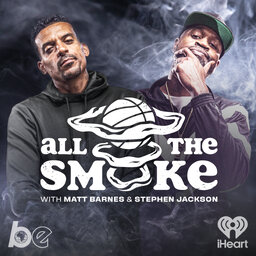Steve Nash | Ep 34 | ALL THE SMOKE Full Episode | #StayHome with SHOWTIME Basketball
All The Smoke is back with another quarantine edition. On episode 34, Matt and Stephen are joined by 2x NBA MVP Steve Nash. The former Suns' point guard ranks MJ, Lebron and Kobe on their greatness and tells stories about playing against them. Nash also dives into his playing days in Phoenix and being traded to the Mavericks.
Learn more about your ad-choices at https://www.iheartpodcastnetwork.com
In 1 playlist(s)
All The Smoke
ALL THE SMOKE pairs two of the most outspoken and controversial players of their time. Known as fier…Social links
Follow podcast
Recent clips

20 Wild Rap Stories From ALL THE SMOKE That Changed the Game
1:31:41

Hornets vs Pistons NBA FIGHT Night: ALL THE SMOKE Reacts
42:42

Willie McGinest on Patriots SECRETS, Brady & Belichick's Genius, Super Bowl XL Preview
1:05:08
 All The Smoke
All The Smoke